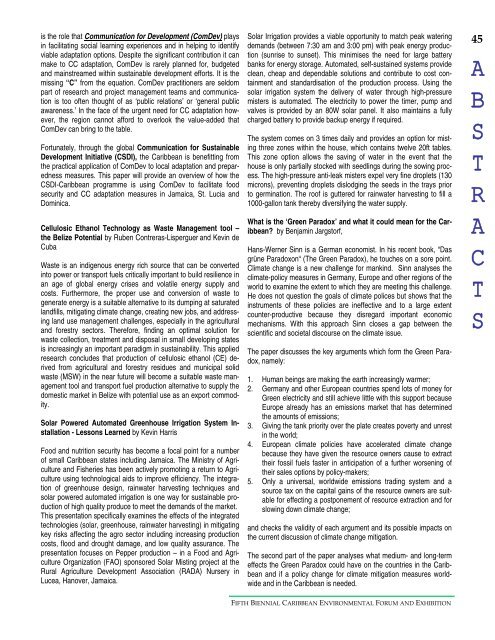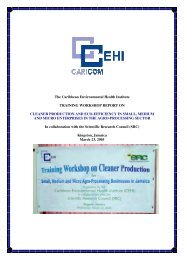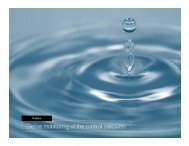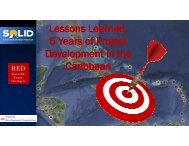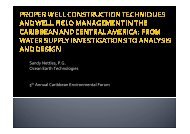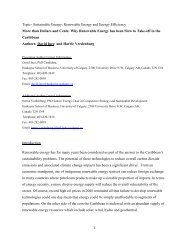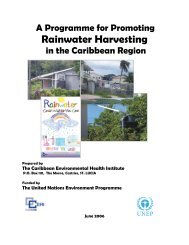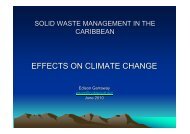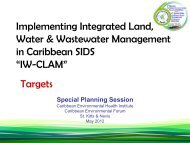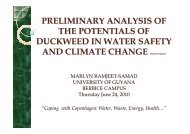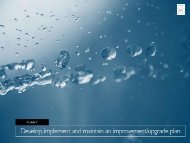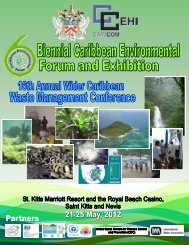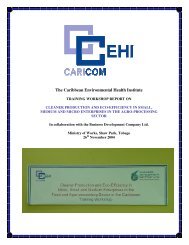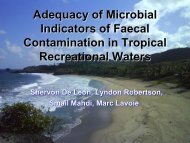conference magazine - Caribbean Environmental Health Institute
conference magazine - Caribbean Environmental Health Institute
conference magazine - Caribbean Environmental Health Institute
You also want an ePaper? Increase the reach of your titles
YUMPU automatically turns print PDFs into web optimized ePapers that Google loves.
is the role that Communication for Development (ComDev) plays<br />
in facilitating social learning experiences and in helping to identify<br />
viable adaptation options. Despite the significant contribution it can<br />
make to CC adaptation, ComDev is rarely planned for, budgeted<br />
and mainstreamed within sustainable development efforts. It is the<br />
missing “C” from the equation. ComDev practitioners are seldom<br />
part of research and project management teams and communication<br />
is too often thought of as ‘public relations’ or ‘general public<br />
awareness.’ In the face of the urgent need for CC adaptation however,<br />
the region cannot afford to overlook the value-added that<br />
ComDev can bring to the table.<br />
Fortunately, through the global Communication for Sustainable<br />
Development Initiative (CSDI), the <strong>Caribbean</strong> is benefitting from<br />
the practical application of ComDev to local adaptation and preparedness<br />
measures. This paper will provide an overview of how the<br />
CSDI-<strong>Caribbean</strong> programme is using ComDev to facilitate food<br />
security and CC adaptation measures in Jamaica, St. Lucia and<br />
Dominica.<br />
Cellulosic Ethanol Technology as Waste Management tool –<br />
the Belize Potential by Ruben Contreras-Lisperguer and Kevin de<br />
Cuba<br />
Waste is an indigenous energy rich source that can be converted<br />
into power or transport fuels critically important to build resilience in<br />
an age of global energy crises and volatile energy supply and<br />
costs. Furthermore, the proper use and conversion of waste to<br />
generate energy is a suitable alternative to its dumping at saturated<br />
landfills, mitigating climate change, creating new jobs, and addressing<br />
land use management challenges, especially in the agricultural<br />
and forestry sectors. Therefore, finding an optimal solution for<br />
waste collection, treatment and disposal in small developing states<br />
is increasingly an important paradigm in sustainability. This applied<br />
research concludes that production of cellulosic ethanol (CE) derived<br />
from agricultural and forestry residues and municipal solid<br />
waste (MSW) in the near future will become a suitable waste management<br />
tool and transport fuel production alternative to supply the<br />
domestic market in Belize with potential use as an export commodity.<br />
Solar Powered Automated Greenhouse Irrigation System Installation<br />
- Lessons Learned by Kevin Harris<br />
Food and nutrition security has become a focal point for a number<br />
of small <strong>Caribbean</strong> states including Jamaica. The Ministry of Agriculture<br />
and Fisheries has been actively promoting a return to Agriculture<br />
using technological aids to improve efficiency. The integration<br />
of greenhouse design, rainwater harvesting techniques and<br />
solar powered automated irrigation is one way for sustainable production<br />
of high quality produce to meet the demands of the market.<br />
This presentation specifically examines the effects of the integrated<br />
technologies (solar, greenhouse, rainwater harvesting) in mitigating<br />
key risks affecting the agro sector including increasing production<br />
costs, flood and drought damage, and low quality assurance. The<br />
presentation focuses on Pepper production – in a Food and Agriculture<br />
Organization (FAO) sponsored Solar Misting project at the<br />
Rural Agriculture Development Association (RADA) Nursery in<br />
Lucea, Hanover, Jamaica.<br />
Solar Irrigation provides a viable opportunity to match peak watering<br />
demands (between 7:30 am and 3:00 pm) with peak energy production<br />
(sunrise to sunset). This minimises the need for large battery<br />
banks for energy storage. Automated, self-sustained systems provide<br />
clean, cheap and dependable solutions and contribute to cost containment<br />
and standardisation of the production process. Using the<br />
solar irrigation system the delivery of water through high-pressure<br />
misters is automated. The electricity to power the timer, pump and<br />
valves is provided by an 80W solar panel. It also maintains a fully<br />
charged battery to provide backup energy if required.<br />
The system comes on 3 times daily and provides an option for misting<br />
three zones within the house, which contains twelve 20ft tables.<br />
This zone option allows the saving of water in the event that the<br />
house is only partially stocked with seedlings during the sowing process.<br />
The high-pressure anti-leak misters expel very fine droplets (130<br />
microns), preventing droplets dislodging the seeds in the trays prior<br />
to germination. The roof is guttered for rainwater harvesting to fill a<br />
1000-gallon tank thereby diversifying the water supply.<br />
What is the ‘Green Paradox’ and what it could mean for the <strong>Caribbean</strong>?<br />
by Benjamin Jargstorf,<br />
Hans-Werner Sinn is a German economist. In his recent book, “Das<br />
grüne Paradoxon“ (The Green Paradox), he touches on a sore point.<br />
Climate change is a new challenge for mankind. Sinn analyses the<br />
climate-policy measures in Germany, Europe and other regions of the<br />
world to examine the extent to which they are meeting this challenge.<br />
He does not question the goals of climate polices but shows that the<br />
instruments of these policies are ineffective and to a large extent<br />
counter-productive because they disregard important economic<br />
mechanisms. With this approach Sinn closes a gap between the<br />
scientific and societal discourse on the climate issue.<br />
The paper discusses the key arguments which form the Green Paradox,<br />
namely:<br />
1. Human beings are making the earth increasingly warmer;<br />
2. Germany and other European countries spend lots of money for<br />
Green electricity and still achieve little with this support because<br />
Europe already has an emissions market that has determined<br />
the amounts of emissions;<br />
3. Giving the tank priority over the plate creates poverty and unrest<br />
in the world;<br />
4. European climate policies have accelerated climate change<br />
because they have given the resource owners cause to extract<br />
their fossil fuels faster in anticipation of a further worsening of<br />
their sales options by policy-makers;<br />
5. Only a universal, worldwide emissions trading system and a<br />
source tax on the capital gains of the resource owners are suitable<br />
for effecting a postponement of resource extraction and for<br />
slowing down climate change;<br />
and checks the validity of each argument and its possible impacts on<br />
the current discussion of climate change mitigation.<br />
The second part of the paper analyses what medium- and long-term<br />
effects the Green Paradox could have on the countries in the <strong>Caribbean</strong><br />
and if a policy change for climate mitigation measures worldwide<br />
and in the <strong>Caribbean</strong> is needed.<br />
45<br />
A<br />
B<br />
S<br />
T<br />
R<br />
A<br />
C<br />
T<br />
S<br />
FIFTH BIENNIAL CARIBBEAN ENVIRONMENTAL FORUM AND EXHIBITION


